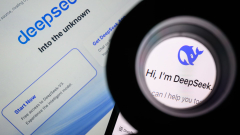This week’s news that the DeepSeek Chatbot app, developed by China, was downloaded from the Apple app store significantly more times than the US-developed ChatGPT from Open AI, wiped billions off the global tech market.
Leon Neal | Getty Images News | Getty Images
Plenty of Americans are discovering the AI search powers of DeepSeek, the breakthrough Chinese generative AI app that surged to No. 1 downloaded status on Apple’s App Store last week. But in an era of U.S.-China technology rivalry and mistrust, and entities from NASA to the U.S. Navy and Taiwanese government prohibiting use of DeepSeek within days, is it wise of millions of Americans to let the app start playing around with their personal search inquiries?
The sudden rise of DeepSeek — created on a rapid timeline and on a budget reportedly much lower than previously thought possible — caught AI experts off guard, though skepticism over the claims remain and some estimates suggest the Chinese company understated costs by hundreds of millions of dollars. Privacy advocates were caught off guard, too, and their concerns aren’t predicated on AI development costs, and they already warning that Americans are putting themselves and their privacy at risk.
The amount of data and information that bad actors in China could harvest from DeepSeek is 20 times worse than what could be collected from a Google search, says Dewardric McNeal, managing director and senior policy analyst at risk management firm Longview Global, which advises companies on China strategy.
“It is a rich trove of intelligence,” said McNeal, who has studied the details of Chinese government data sharing requirements for domestic firms.
There are obvious risks, he said, such as personal banking or health information that can be stolen, and prominent cybersecurity firms are already reporting vulnerabilities in DeepSeek. DeepSeek itself reported being hit with a major cyberattack last week.
But McNeal is just as worried about the “bigger picture” competition between nations.
“I want us to speak broader than just the narrow data; we often don’t speak about the degree to which this information paints a mental map through understanding queries,” McNeal said.
For example, Chinese intelligence could use the broader patterns of queries in DeepSeek to learn about various American industries and to sow division among the public.
“The world won’t end tomorrow because I logged into DeepSeek,” McNeal said, but he added that does not mean there isn’t considerable risk involved. The AI’s open-source approach, for one, could give China access to US-based supply chains at an industry level, allowing them to learn what companies are doing and better compete against them. “National security professionals are thinking about it in those terms,” McNeal said.
Matt Pearl, a special advisor to the deputy national security advisor at the National Security Council in the Biden administration and now the Strategic Technologies Program director at the Center for Strategic and International Studies, said DeepSeek’s privacy policy implies that people have control over what is collected, but it should induce alarm.
“DeepSeek’s privacy policy is not worth the paper it is written on,” Pearl said. DeepSeek is subjected to PRC laws and anything entered into the app is fair game. Through keystroke patterns, a DeepSeek user can be tracked across all devices, information gathered from advertisers, and DeepSeek could also seek to leverage cameras and microphones, according to Pearl.
“If they can do it technically in the app and the PRC determines it is something they want to do, then it poses a danger,” Pearl said.
But the threat that Pearl said most keeps him up at night is related to cybersecurity and the potential for a mass malware injection. “It is hard to emphasize all the different





